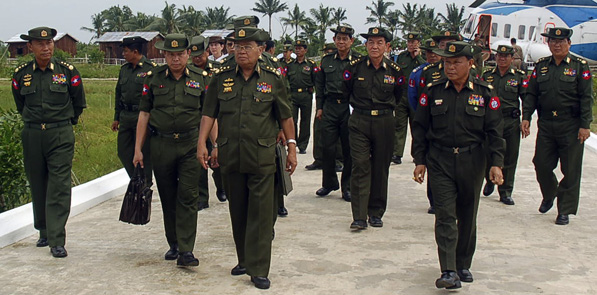Escaping the Traps of the Past

Although Burma’s upcoming Nov. 7 election will not resolve the country’s ongoing political crisis or provide much-needed reforms, one should not be blind to the fact that the election will have consequences—whether negative or positive. Political actors who either participate in or boycott the election will bear the aftershocks of this event. Political players will not be able to write their political plans on a blank slate. Instead, they have to work with what is at hand.
The 2010 election will contribute to changes in the format of governance—the transformation of the one-dimensional military junta into a hybrid form of government that includes both political and military elements. Regardless of who pulls the strings, this could lead to either a serious internal split or the utter inefficiency of the ruling body.
 |
| Leadership of the NDF, including chairman Khin Maung Swe. (Photo: MMM/The Irrawaddy) |
If this reshuffle indicates that Than Shwe has made a pre-mortem succession arrangement by installing an heir apparent and investing him with considerable power to manage the Tatmadaw, or armed forces, the opposition and its advocates should celebrate this development as good news for two reasons.
First, this transition is an inter-generational succession, unlike the intra-generational shift from Saw Maung to Than Shwe in 1992. For the departing Than Shwe to continue to control the political role of the Tatmadaw and call the shots for key policy decisions, he needs to create a formal position for himself and leave the army chief position to a successor who is not only loyal but also weak.
Temporarily, at least, this could mean a disruption of personalized power among the military top brass—something that the opposition could seize upon as an opportunity to reformulate a new and positive dynamic of civil-military relations. It is particularly significant that this will occur within the context of a transition from military to hybrid rule. Unlike one-party rule and the closed socialist economy under former dictator Ne Win, the new hybrid political arrangement and market economy will make it difficult for the departing leaders to control the military completely, especially when the role of Than Shwe fades away due to a decline in his health or other causes.
Second, if Than Shwe is confident enough to assume the role of president in the aftermath of the election and dedicates more of his energies to overseeing the Union Solidarity and Development Party (USDP), it will give the military a chance to gradually detach itself from past wrongdoings and renew the integrity of the institution.
We have seen attempts by the military to break with the past before. For instance, as retired Lt-Gen Chit Swe revealed in his memoir, some senior officers who took part in the 1988 coup wanted to dissociate themselves from the failures of the defunct Burma Socialist Programme Party (BSPP), noting that the massive popular uprising of that year was directed at ruling socialist party politicians, not the army.
Thus the military’s claims to a distinct corporate identity could allow it to distance itself even from soldiers-turned-politicians if the new government faces a crisis of legitimacy. If the Tatmadaw was able to part ways from the ruling party following the socialist era, when all soldiers were technically party members, it can certainly assume a distinct role from the USDP, which is set to become as ideologically vacuous and deeply hated as the BSPP.
Such a change in the Tatmadaw’s power dynamic in the post-election period could open the way for a new civil-military relationship. Thus the election could prove consequential for the opposition, particularly the National League for Democracy (NLD) led by Aung San Suu Kyi.
1 | 2 | 3 next page »
|
||
|
||
|
||
|
||
